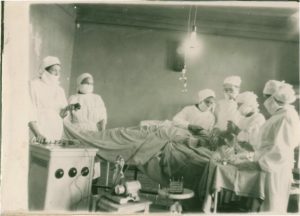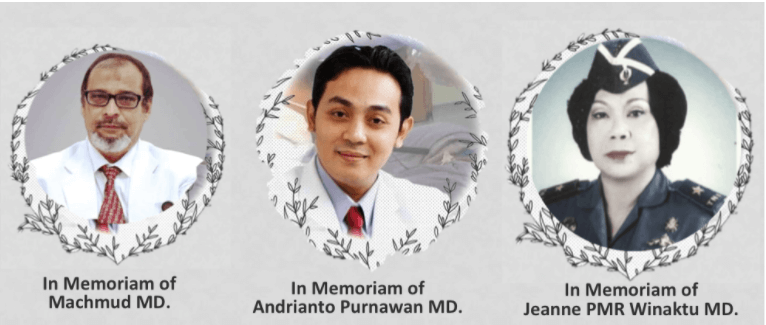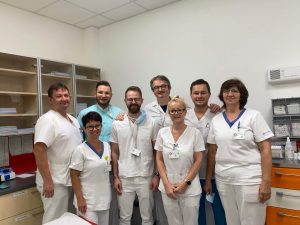Summary of the discussion points during the round table meeting in conjunction of the ACNS Red River Bootcamp, Hanoi Vietnam, 8th-9th December 2023
– CLICK HERE TO DOWNLOAD REPORT
Venue: Level 2, Grand Plaza Hotel, Hanoi, Vietnam
DATE: 9th December 2023
Time: 3.35pm -4.30pm
Attendees:
- Yoko Kato
- Dong Van He
- Naoki Otani
- Mizuho Inoue
- Satoru Miyawaki
- Hidehito Kimura
- ShunsukeNakae
- Hitoshi Fukuda
- Hiroki Morisako
- Ichiro Takumi
- Joji Inamasu
- Raja K. Kutty
- Matron Yee Yit Cheng
- PhungThiHanh
- Mai Okubo
- Nanae Seino
Summary
The President of the Asian Congress of Neurological Surgeons (ACNS), Prof. Yoko Kato conveyed her appreciation to all the speakers for attending in this inaugural ACNS Red River Bootcamp in Hanoi, Vietnam and has contributed enormously in this educational activity.
The meeting commenced with a suggestion to have a cadaveric workshop next year by majority of the members. Prof. He informed the members of the possibility to hold the next workshop in Ho Chi Minh City in December 2024. All members agreed to join the next bootcamp.
The following discussion points were accepted by all the members:
- To provide at least one day workshop with more stations equipped with microscopes
- For symposium, the organizer needs to provide monitor and pointer for the speakers
- To assign chairperson and designated commentators or discussants for the symposium.
- To organize workshops such as skull base surgery, vascular anastomosis, endoscopic surgery and functional neurosurgery.
- May have cadaveric workshop or workshop using high quality standard models.
- To offer fellowships for candidates from Vietnam to join institutions of the respective speakers.
- To initiate pre-learning objectives and evaluation to be conducted after the workshop.
- All participants to be encouraged to ask questions during symposium.
- To conduct at least one day nursing symposium with hands-on workshops.
- To encourage all speakers to bring at least one young doctor and nurse from their institution to attend the future events.
- He proposed for the next bootcamp on 16thMay 2024 at Viet Duc University in Hanoi and /or in December 2024 in Ho Chi Minh City, Vietnam.
The meeting was closed by Prof. Yoko Kato at 4.00pm.
Reported by
Dr. Liew Boon Seng
Assistant Secretary, ACNS
Approved by
Prof. Yoko Kato
President, ACNS
About my workplace
Dr. Vladimir Balik
I was lucky …
Most people think that the performance of tough surgeries is an essential prerequisite to become a neurosurgeon — well it might be, but I am sure that it is much more. It is a strength to never give up and a belief in your abilities at a time when many have stopped believing you. Moreover, I think it is the sense of equality, fair play, and justice, the courage to push the boundaries and not to abuse position, the acceptance of hard work as daily routine and perfectionism in the operating room along with the most refined sense of detail, no matter what type of surgery you do.
To meet a mentor or teacher who represents such qualities is simply luckiness. And I was lucky. Early on my neurosurgical way I encountered several masters like that. Juha Hernesniemi, Madjid Samii, Vinko Dolence, Volker Seifert, or Katsumi Takizawa belong to the neurosurgical pantheon. Thanks to them, I found out how far the borders of current neurosurgery go and how to approach them. Yoko Kato, a strong but generous and wondrous woman in neurosurgery, stands out among the masters. In her personality, almost all of the aforementioned features meet. One of her most admirable and following worthy features is her never-ending effort to support young people. Honestly, I do not know a person who would believe in me more and support me more in my difficult times. In 2015 I attended a fellowship in Nagoya under her supervision and it was like a 3-month-long lasting explosion of joy from neurosurgery.
From my first fellowship to the last one I have tried to take as much as possible from each of the mentors. Over time I started dreaming about a day when I will get a chance to apply all that I have learned from them. In 2020 I got the chance to take part in creating and developing a new neurosurgical department. Although the covid slowed it down a bit, my vision and ambition to develop the department providing patients with comprehensive neurosurgical care all at one institution remain unchanged. At present we provide operative and non-operative management, such as prevention, diagnosis, evaluation, treatment, critical care, and rehabilitation of neurological disorders within the catchment area of more than 750,000 people. Our initial neurosurgical portfolio includes the diagnosis and treatment of patients with injury to the brain and disorders of the spinal cord, spinal column, and peripheral nerves within all parts of the body. The next step is going to be cranial surgery, both brain tumor and neurovascular. My hospital in Michalovce city reminds me a lot of Banbutane Hotokukai Hospital in Nagoya with its floating bed system. Our central intensive care unit has 6 beds and 17 beds are designated for intermediate intensive care. A neurosurgical operating room is fully equipped including an operating microscope and intraoperative x-ray. The radiological department provides a variety of imaging modalities, such as x-ray, ultrasound, computed tomography (CT), nuclear medicine including single-photon emission computed tomography/CT (SPECT-CT) hybrid imaging, and magnetic resonance imaging. Recently, a center of interventional angiology has been set up aiming at neurointerventions. We have extensive cooperation with neurologists, oncologists, orthopedists, traumatologists, and physiotherapists. I and my colleague are board-certified neurosurgeons while our young colleagues are in the residency program. During the residency program in my country, neurosurgeons are trained in all aspects of neurosurgery, including the cerebrovascular system, the spine and spinal cord, trauma, tumors, pain management, and pediatric surgery. Residents complete a minimum of 72 months of training, with at least 54 of those months are devoted to clinical neurosurgery and a minimum of 3 months devoted to clinical neurology. What makes me especially happy is the high interest in neurosurgery among medical students. The majority of them are women – hope they will follow Professor Kato`s footsteps.
Vladimír Balik, MD, PhD
- Department of Neurosurgery
- Svet Zdravia Hospital
- Michalovce city
- Slovak Republic
- European Union
General state of neurosurgical care in Uzbekistan
G.M. Kariev, D.M.Mamadaliev
Brief historical aspects
A recent report based on the latest data from statistics of Republican scientific-practical medical center of neurosurgery in Tashkent, Uzbekistan. The “birth” of Uzbekistan’s neurosurgery dated back to 1943, when Tashkent Medical Institute neurology department was just established and leaded by prof. L.Y. Shargarodski (1896-1959), then by initiatives by surgeon, professor I.I.Orlov (1888-1952) was founded first neurosurgical department. In 1946 at the basis of Research institute of traumatology opened neurosurgical department for 20 beds, Chief – Tishin А.G. Later on, in this department worked Prof. Kariev M.H., prof. Mirsadikov А.S.
Eventually prof. M.H.Kariev has made a great effort and contribution in foundation of recent Republican neurosurgical center, which serves as one of the chief clinical centers for all neurosurgeons who is going to take a neurosurgical specialization.

Statistical data
Overall number of neurosurgical beds in the Republic – 963. (2019) For 2019y patient admission rate per year was 72 594. Overall number of operations (including emergency) are 10470 for 2019. From them 7370 planned cases (70.4%), 3100 (29,6%) are emergency cases. By type of pathology- mostly treated neurotraumatological cases (24 917) then oncological (3880) and congenital pathologies- (1016). Mortality rate in 2019 in hospital was 853 patients from overall treated 49120 (1.73%) a little more in contrast to 2010y (it was 469 death from 34938 patients-1,34%) which can be explained by increased number of patient admission and complexity of surgeries.

Our neurosurgical treatment and needs
Mostly treated neurosurgical disorders which include cerebral aneurysms, AVMs, cavernous malformations, (both endovascular and open) brain tumors, (including skull base and craniocervical junction tumors) epilepsy, hemorrhagic stroke, all types of spinal trauma and disc herniations, spinal canal stenosis, spinal tumors, pediatric neurosurgery, traumatic brain injuries with a higher proportion of diseases in rural area as compared to urban centers.
Unfortunately due to lack of experience and equipments, functional neurosurgery is poor developed. Only pharmacologically refractory epilepsy can be surgically treated. Neither Republican neurosurgical center nor private institutions have facilities for deep brain stimulation, stereotactic instruments, for Parkinson’s disease and other movement disorders.
We have some positive aspects regarding pain surgery. Recently we have started using of high frequency ablation for different pain syndromes. Same can be stated for endoscopy. Newly installed Karl Storz systems are mostly being used for pituitary surgeries. But spinal cases are exclusion due to lack of experiences.

Last two years, thanks to better diagnostic instrument supplementation by the government, Uzbekistan had to face new challenges in neurosurgical care due to better diagnostics of vascular pathologies, cerebral aneurysms, AVMs, and other rare entities. This led to preparation of new neurosurgeons for vascular departments of many hospitals. So we can say that vascular neurosurgery is the youngest branch and yet needs more support in this regard. It is also noteworthy to emphasize the fact that in rural areas of the republic, basic diagnostic equipments like CT are in need. People with intracerebral hemorrhage are often being misdiagnosed as ischemic stroke and treated by neurologists. This indirectly causes increases the number of mortality. Another problematic scene with pediatric population which have poor organized neurosurgical screening for in utero CNS anomalies, resulting in stable numbers of spina bifida and other CNS defects in outpatient diagnostic departments.

Neurosurgeons, Education, and Societies
Uzbekistan has approximately 291 neurosurgeons (including about 8 women) for 34,03 million people. Of the 6 approved medical universities (Tashkent medical academy, Tashkent pediatric medical institute, Bukhara medical institute, Andijan medical institute, Urganch medical institute), all 6 have neurosurgical departments.
The duration of the neurosurgery residency program changed from 3 years to 4 years. But for master’s degree is not changed (3 years). Most of the government hospitals and medical universities across Uzbekistan still lack basic neurosurgical infrastructure, and hence incapable of providing neurosurgical training. That’s why as basic training centers considered Republican neurosurgical center and Republican center of emergency medicine where residents can train basic neurosurgical skills.
Moreover, some private hospitals with extensive infrastructure have been started some neurosurgical cases which are not too complex and feasible. Nevertheless, there is still no cadaveric laboratories which can provide hands-on-exposure and “cutting and stitching” for neurosurgery residents.
Started from 1991, Uzbek Neurosurgical Society established and began actively involving in international neurosurgical societies including WFNS and ACNS. By active cooperation with World arena of colleagues, plenty of surgeries has been done and master classes by experienced neurosurgeons from Japan, Turkey, Russia, India and many other countries was organized.
Note:
By: Prof. Bajamal, Indonesia
Since early March 2019, the C-19 case was detected in Indonesia, so the government has made various security policy efforts. Now vaccinations are running well and 2 million have been implemented out of the target population of 188 million that need to be vaccinated. The most encouraging thing is that all of the health workers are currently vaccinated. We have 402 neurosurgeons in Indonesia serving a population of 370 million. Indeed, neurosurgery services since the beginning have been quite severely affected, so it is clear that neurosurgery services have decreased. Besides that, what is more disturbing is the impact on training residency. Because the residency training is under the responsibility of the Dean of the Medical Faculty. In this case, the dean was more concerned about the dangers of exposure to the resident, so there was a reduction in resident activity related to the C-19 case. Other things that are quite important in this training process include the cancellation of fellowships to several countries abroad.
What was very touched was that there were quite a lot of victims of health workers, 240 doctors who died and three of them were neurosurgeons who were victims of C-19, namely Dr. Sianne Winaktu, Dr. Mahmud, Dr. Andrianto Purnawan. We are deeply saddened by their loss.

Since the end of February 2021, there appear to be signs of a decrease in the number of cases hospitalized and also a decrease in the number of cases who die, which gives us significant hope. Now with strict and fast screening, more surgeries are being performed and outpatient visits are getting better. What is quite encouraging is that the hectic activities of transferring knowledge and experience can be seen with the zoom webinar activity held by various neurosurgery education centers in Indonesia. We all hope that this pandemic will be resolved well and in the future, neurosurgical services and training will develop further.



